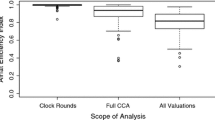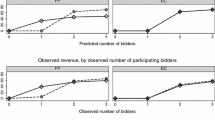Abstract
We examine bidding behavior in a clock auction in which price is set by the lowest-accepted bid and provisional winners are reported each round (the LABpw auction). This format was used in the India 3G spectrum auction. In the standard theory, the auction performs poorly. In particular it yields lower revenues and is less efficient than the more standard clock auction with exit bids and highest-rejected-bid pricing (the HRB auction). However, the LABpw auction performs well in the lab, achieving higher revenues than the HRB auction. We show how fear of losing provides one motivation for the overbidding that causes higher revenues in the LABpw auction.
Similar content being viewed by others
References
Ausubel LM, Cramton P (2004) Auctioning many divisible goods. J Eur Econ Assoc 2: 480–493
Ausubel LM, Cramton P, Filiz-Ozbay E, Higgins N, Ozbay EY, Stocking A (2011) Common value auctions with liquidity needs: an experimental test of a troubled assets reverse auction. Working Paper, University of Maryland
Cox JC, Roberson B, Smith VL (1982) Theory and behavior of single object auctions. Res Exp Econ 2: 1–43
Cox JC, Smith VL, Walker J (1988) Theory and individual behavior of first-price auctions. J Risk Uncertain 1: 61–99
Cramton P, Filiz-Ozbay E, Ozbay EY, Sujarittanonta P (2012) Discrete clock auctions: an experimental study. Exp Econ 15(2): 309–322
Cramton P, Sujarittanonta P (2010) Pricing rule in a clock auction. Decis Anal 7: 40–57
Delgado MR, Schotter A, Ozbay EY, Phelps EA (2008) Understanding overbidding: using the neural circuitry of reward to design economic auctions. Science 321: 1849–1852
Engelbrecht-Wiggans R, Katok E (2008) Regret and feedback information in first-price sealed-bid auctions. Manag Sci 54: 808–819
Filiz-Ozbay E, Ozbay EY (2007) Auctions with anticipated regret: theory and experiment. Am Econ Rev 97: 1407–1418
Filiz-Ozbay E, Ozbay EY (2010) Anticipated loser regret in third price auctions. Econ Lett 107(2): 217–219
Fischbacher U (2007) z-Tree: Zurich toolbox for ready-made economic experiments. Exp Econ 10(2): 171–178
Kagel JH (1995) Auctions: a survey of experimental research. In: Roth AE, Kagel JH (eds) Handbook of Experimental Economics. Princeton University Press, Princeton
Kagel JH, Levin D (1993) Independent private value auctions: bidder behaviour in first-, second-, and third-price auctions with varying numbers of bidders. Econ J 103: 868–879
Kagel JH, Levin D (2008) Auctions: a survey of experimental research, 1995–2008. In: Roth AE, Kagel JH (eds) Handbook of Experimental Economics, vol 2. Princeton University Press, Princeton
Kinetz E (2010) India’s 3G spectrum auction raises $14.6 billion. The Associated Press, New York
Kőszegi B, Rabin M (2006) A model of reference-dependent preferences. Q J Econ 121: 1133–1166
Lange A, Ratan A (2010) Multi-dimensional reference-dependent prefer-ences in sealed-bid auctions: how (most) laboratory experiments differ from the field. Games Econ Behav 68(2): 634–645
Sugden R (2003) Reference-dependent subjective expected utility. J. Econ. Theory 111: 172–191
Author information
Authors and Affiliations
Corresponding author
Additional information
We thank our colleagues, Lawrence M. Ausubel and Daniel R. Vincent, for helpful discussions. We thank the National Science Foundation for support.
Rights and permissions
About this article
Cite this article
Cramton, P., Filiz-Ozbay, E., Ozbay, E.Y. et al. Fear of losing in a clock auction. Rev Econ Design 16, 119–134 (2012). https://doi.org/10.1007/s10058-012-0121-y
Received:
Accepted:
Published:
Issue Date:
DOI: https://doi.org/10.1007/s10058-012-0121-y




